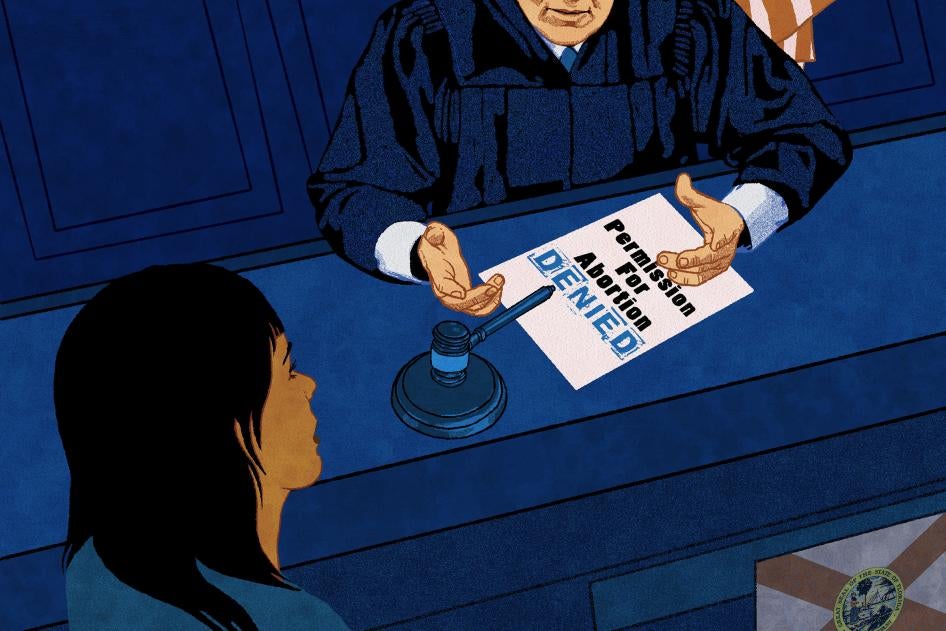(Miami) – Judges in the US state of Florida often deny people under age 18 their right to access abortion care, Human Rights Watch said in a report released today. The state’s harmful law forcing anyone under 18 to obtain parental consent for an abortion pushes young people without a supportive parent or guardian to seek a judicial waiver through a burdensome, potentially traumatizing, and highly arbitrary court process called “judicial bypass.”
The 39-page report, “Access Denied: How Florida Judges Obstruct Young People’s Ability to Obtain Abortion Care,” documents how in Florida many judges deny young people’s petitions, forcing them to continue a pregnancy against their wishes, travel outside the state, or seek a way to manage abortion outside the health system. Judges have the power to make highly subjective determinations about a young person’s maturity and interests. Vague criteria in state law enable highly arbitrary decision-making, with judges making decisions based on factors such as the young person’s grades and impressions of their demeanor during a nerve-wracking hearing.
“No one should have to go before a judge to exercise their human right to access abortion care, and judges should not hold the power to determine a person’s ability to obtain basic health care,” said Margaret Wurth, a senior researcher at Human Rights Watch and the author of the report. “Florida authorities should end this dehumanizing denial of young people’s rights.”
Each year, about 200 young people go through judicial bypass in Florida. A recent article in the American Journal of Public Health estimated that about 15 percent of those under 18 who obtain abortions in the state each year go through the process. In 2020 and 2021, judges denied more than 12 percent of their petitions.
A young person’s ability to obtain a judicial waiver is significantly determined by the county in which they live, Human Rights Watch said. Hillsborough County, home to the city of Tampa, denied a far greater number and proportion of cases than any other Florida county, dismissing more than half of the county’s 2021 petitions.
Human Rights Watch analyzed data from Florida courts on the judicial bypass process in recent years and reviewed publicly available court records from cases decided by appeals courts. Those denied by both trial courts and appeals courts included a young person seeking abortion care after a traumatic event without an attorney representing her, a young person with absent and unsupportive parents, and a young person who was exempt from the law but ended up in court because neither her attorney nor the judge understood the exemption. Court records from some cases read like the results of a personality test. In one case, a young person’s “soft spoken and shy” demeanor seemed to be a factor in the judge denying her petition.
Allowing judges to decide whether young people can access health care is inherently problematic and incompatible with the right to health, Human Rights Watch said. The system leads to outcomes in which a young person is deemed too immature to make an abortion decision but mature enough to remain pregnant and potentially be forced to raise a child.
Even when courts grant the judicial bypass requests, the delays caused by the process can make abortion inaccessible. And the need to appeal a decision increases the delay.
Since the US Supreme Court overturned the constitutional right to access abortion in June 2022, more than a dozen US states have banned nearly all abortions, including several states near Florida. Abortion remains legal in Florida in the first 15 weeks of pregnancy, but pregnant people must wait at least 24 hours after an initial visit to have an abortion, in addition to forced parental consent and notification for those under 18. The Florida Supreme Court has agreed to hear a challenge to the 15-week ban but did not temporarily block the law.
Decades of research have shown that most people under 18 seeking abortion care involve a parent or another supportive adult in their decision, even when state law does not require it. Those who do not often have no access to an eligible parent or fear parental involvement will lead to severe consequences such as abuse, loss of housing, family alienation, or forced continuation of a pregnancy against their wishes.
Young people in these circumstances can petition a state trial court for a waiver of the state’s parental consent requirement through the judicial bypass process. To obtain a waiver, a young person must demonstrate to a judge that they are sufficiently mature to decide to have an abortion without parental involvement, or that involving a parent is not in their best interest, or that they have experienced abuse by a parent or legal guardian.
Forcing young people who choose not to involve a parent in their abortion decision to then go through a court process delays their care and creates risks that the matter won’t remain confidential, potentially jeopardizing their safety and well-being, Human Rights Watch found.
Florida legislators should repeal the state’s parental consent and notification law and ensure that people under 18 can access confidential, timely abortion care without being forced to either involve an unsupportive parent or go to court. The US Justice Department’s Reproductive Rights Task Force should open an investigation into judicial bypass and youth abortion access in Florida as part of its mandate to examine state actions that impair the ability to seek reproductive care in states where abortion is legal.
“Young people have the right to make their own healthcare decisions without being subjected to a stressful and traumatizing court process, and a judicial veto,” Wurth said. “Florida leaders should affirm young people’s rights and dignity by repealing forced parental consent.”










